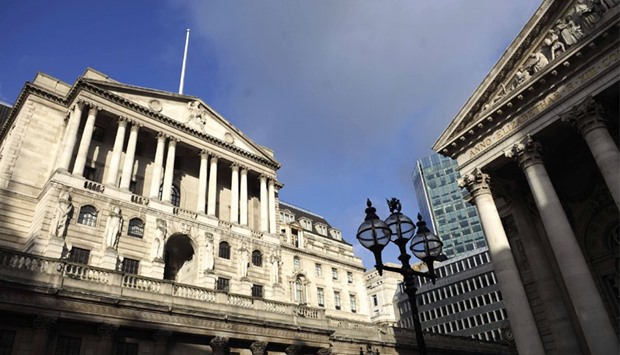Bank of England officials said the near-term outlook for UK growth and inflation has weakened further as they kept their key rate at a record low.
After a tumultuous start to 2016 for global markets and a slump in oil, eight of the nine members of the Monetary Policy Committee said keeping the benchmark at 0.5% for now would “best balance the risks” facing the economy. In the minutes of their January meeting, published in London yesterday, officials said they need time to assess the implications of recent market volatility.
The 8-1 vote split was forecast by economists in a Bloomberg News survey, with Ian McCafferty keeping up his push for a 25 basis-point increase. He cited upside risks to domestic costs and the recent depreciation of the pound as factors that might push inflation above target.
“Recent volatility in financial markets has underlined the downside risks to global growth, primarily emanating from emerging markets,” officials said in a statement. While recent declines in oil “will depress global inflation in the near term,” they may also support domestic spending, they said.
Borrowing costs have been unchanged for almost seven years and yesterday’s minutes signal policy makers have little inclination to begin tightening any time soon. Risks stemming from the international turmoil and the prospect of Britain voting to leave the European Union prompted banks including Goldman Sachs Group, Bank of America-Merrill Lynch and JPMorgan Chase & Co to push back their forecasts for the timing of the first rate increase to the fourth quarter.
With inflation far below the BoE’s 2% target, officials also noted that pay growth remains “restrained” and has dipped in recent months. The expected pickup in the headline rate would be “a little more modest than previously assumed,” while business surveys point to a slower pace of growth, they said. Staff cut their estimates for expansion last quarter and this quarter to 0.5%.
“It’s not the dovish affair that a lot of people thought it could be, and particularly McCafferty didn’t throw the towel in, either,” said Alan Clarke, an economist at Scotiabank in London. “They could’ve been a lot more aggressive than they were on wages.”
The central bank also noted the turmoil in financial markets. Global equities slid by the most in more than four years last week and the FTSE-100 Index has fallen more than 6% this year.
While the MPC said this “underlined the downside risks to global growth,” it didn’t draw any conclusions about the potential impact to the economy. It will provide a more detailed assessment of the outlook with next month’s decision, when it publishes its quarterly Inflation Report.
The pound initially strengthened against the dollar after the BoE announcement, before dropping back. It was trading at $1.4395 as of 12:54pm London time, down 0.1% from Wednesday.
The bank also noted that the recent oil-price drop was a supply-side issue and that the lower costs may ultimately provide some support to spending in the UK and its main trading partners. On the pound, it said sterling’s depreciation since November raised the prospect of a lower drag on inflation through import prices.

The Bank of England (BoE) building in London. After a tumultuous start to 2016 for global markets and a slump in oil, eight of the nine members of the BoE’s Monetary Policy Committee said keeping the benchmark at 0.5% for now would u201cbest balance the risksu201d facing the economy.
